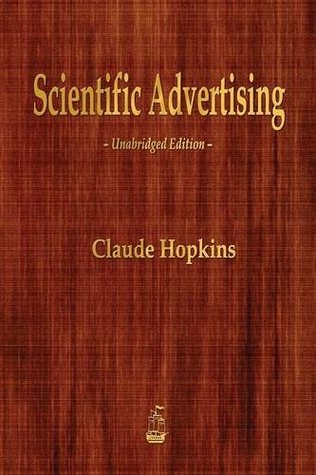I read a book a while back and I forgot to publish my review of it. Scientific Advertising by Claude Hopkins is a great place to start if you’ve never read a book on advertising before.
 Traditional direct response marketing has a ton of similarities with online marketing. It’s no wonder why some of the best online marketers out there like Frank Kern and Russel Brunson study it religiously.
Traditional direct response marketing has a ton of similarities with online marketing. It’s no wonder why some of the best online marketers out there like Frank Kern and Russel Brunson study it religiously.
Personally, I found it very enlightening to learn more about direct response because it’s helping me sell my own digital products and courses. While this is a very slim book, there are some nuggets of gold to be found.
I’ll include some of my notes from the book below. I also recommend picking up a copy for yourself.
Growing up, I never understood why people look at advertisements. Don’t they realize that others are trying to sell them products?
Some of the ads that I saw seemed stupid, dumb, or that they talked about products I myself would never consider.
This book helped me to understand the principles behind these advertising methods. Specifically, how attracting the right kind of person, is all that matters.
As I got older, I started to understand why copywriters talk the way they do. I also started to look at advertisements myself when I thought a product could solve one of my pain points.
This book will help you to wrap your head around WHY certain advertisements work and others don’t.
Notes
The only purpose of advertising is to make sales. It is profitable or not. It is not for general effect. It is not to keep your name before the people. It is not primarily to aid your other salesmen.
Fine talkers are not good salesmen. They create a fear of over-influence and suspicion the person is being sold on lines other than merit.
Successful salesmen know how to use words that convince.
No one reads ads for amusement. They are seeking information. Ads are not written to entertain. Ad writers forget they are salesmen and try to be performers. Instead of sales, they seek applause.
Ads offer information, site advantages to users, and prove claims without any cost or risk.
“The more you tell, the more you sell.”
The salesman is there to demand attention. He can’t be ignored. Neither can the ad.
Headline is to pick out people you can interest.
What you have will interest certain people only and for certain reasons. You care only for those people. Create a headline that will attract or hail those people.
People aren’t going to read unless you make the headline worthwhile. People want to be amused or benefited.
The entire return for an ad depends on attracting the right sort of readers.
Curiosity is one of the strongest human incentives. Cheapness is not strong appeal. Americans want extravagant. They want bargains, but not cheapness. They want to feel they can afford to eat and wear the best.
Psychology – say you paid $10,000 for ____. Assign value.
If offer is limited to certain class of people, it’s more effective.
Point out qualities to notice in an article and people will find them in the product. Be made aware of claims and proof.
General statements count for little, because everyone has some exaggeration. Someone who makes a specific claim is telling a truth or a lie. A specific statement makes people realize you’ve done tests and comparisons.
Example: “The final result of testing and comparing __ formulas.”
Definite = actual tests.
Use pictures only to attract those who may profit you.
No advertiser could afford to educate on things alone, but great success has been made by going to people already educated and satisfying their created wants.
Trend = creation of new desires. Then, satisfy those desires.
People will do much to cure trouble, but people will do little to prevent it.
One by one, you find winners. Then, you have a bunch of them and they can bring in revenue.
Show a bright side, the happy and attractive side, not the dark and uninviting side of things.
When name itself describes the product, it makes a valuable display.
When names don’t, long-continued advertising may give them meaning, which then makes them become valuable.
If a name also classifies product with other similar ones, then advertising will create demand and other products will also benefit.
Most people waste money on ads, but most people think it will be good because others are doing it.
